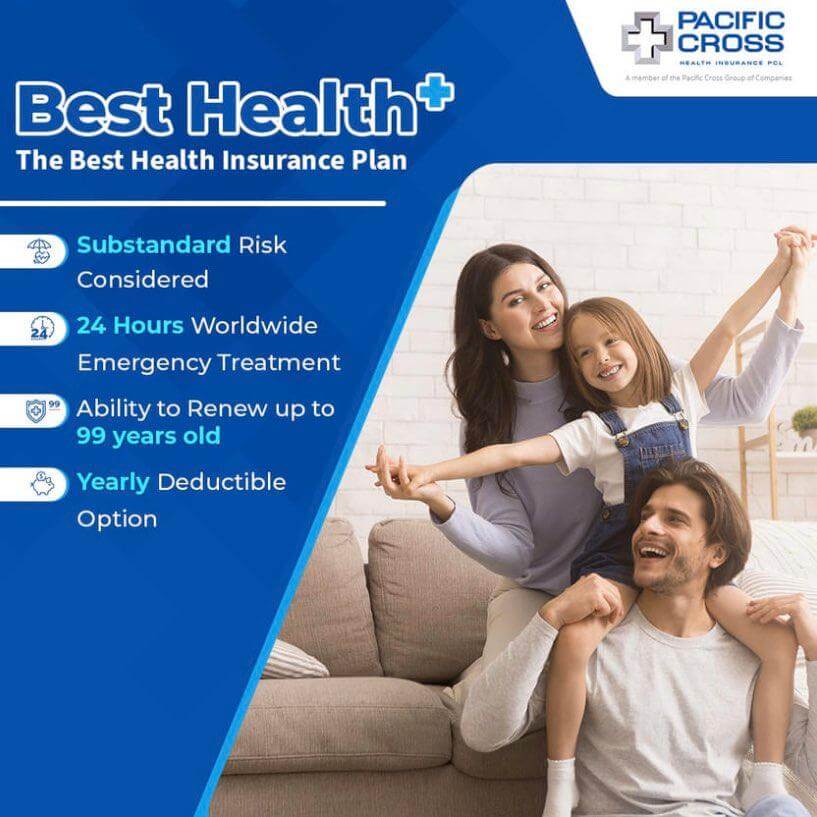Home › Health insurance
Learn more about Health Insurance in Thailand
The most comprehensive health insurance packages available in the market. We offer worldwide coverage 24/7. With our coverage and competitive premiums that covers actual medical expenses both inpatient and outpatient with lifetime maximum limits of up to 50 million Baht per disability/year and choices for discount and annual deductibles. There are 9 different plans to meet yours different requirements.
Table of contents
What is health insurance in Thailand?
Why choose Pacific Cross for health insurance?
How to get cheaper health insurance?
How to choose a health insurance?
What are the best health insurance in Thailand?
What to do when visiting a Thai hospital?
How good are Thai hospitals?
What benefits of family health insurance?
How to apply for health insurance in Thailand?
Why need health insurance for O-A visa?
What is health insurance in Thailand?
Nobody expects to get sick or injured, but unpleasant things can happen even when you are young and healthy; this is where health insurance can assist. A health insurance policy is a legally binding contract between an insurance company and the policyholder (you). Typically, the contract period is limited, and payments (known as premiums) are required to keep your coverage valid. This contract will also provide various facts and conditions for each policy, implying that the insurance company is responsible for your medical care expenditures, among other things, depending on your policy.
Simply put, healthcare protects you from having to pay the full cost of medical procedures if you are injured or become ill. Without health insurance, a single incident might wipe away your whole life savings. Health insurance covers hospitalization, death, ICU expenses, operation fees, and many other things. Finally, healthcare will provide you the required sense of security, allowing you to live your life without worry.
Why choose Pacific Cross for health insurance?
Pacific Cross, one of Asia’s major private health insurance companies, provides solid service with a wide selection of medical insurance solutions in Thailand. Our adaptable network provides service at hundreds of connected hospitals around the country, providing you with 24-hour coverage that allows you to rest comfortably. Furthermore, our foreign health insurance in Thailand covers a wide range of illnesses and injuries, making it one of the most reputable products on the private healthcare market.
Pacific Cross health insurance for expatriates provides an unrivaled mix of adaptability and ease, making it the finest healthcare in Thailand, with generous levels of coverage, fast service, and assured renewability. We provide a range of alternatives, from limited to comprehensive coverage, allowing our clients to select the best plan for their requirements.
Pacific Cross also offers corporate and individual policies, allowing you to maintain your expat health insurance in Thailand sleek, strong, and well-organized. We also guarantee renewability, guaranteeing that a long-term solution for Thailand health insurance for foreigners is always accessible.
A solid health insurance plan is essential in today’s environment, assuring quick, dependable, and professional coverage when you need it the most. Health is priceless, whether you reside in Thailand or are passing through, whether you are alone or with family and friends, and there is no alternative for the safety net that comprehensive health insurance for Thailand can give.
The Pacific Cross Group of Companies was founded 60 years ago as an early provider of health insurance in Asia. Our current array of health care plans benefits from this depth of experience and skill, putting our knowledge to work for you.
Simply explore our online variety of health care packages and contact us immediately by phone or email to pick your new health plan. The sign-up procedure is quick and simple, and once you activate any of our nine distinct packages providing health insurance in Bangkok and beyond, you’ll be able to live safely knowing that you’re protected by the finest.
How to get cheaper health insurance?
Health insurance does not always have to be expensive; by following these tips, you may be able to reduce your health insurance costs.
1. Understand your requirements and your budget
The first step is to ensure that you understand what you require from your insurance plan. Obtaining medical insurance with solely inpatient benefits and lower coverage limitations is one approach to reduce the cost of your premiums. Exclusions of specific coverages in an insurance plan, for example, should make it less expensive. You should also check for any pre-existing conditions.
2. Determine whether you require outpatient care
Premiums for an inpatient-only expat insurance plan will be lower than those for a more complete choice including outpatient coverage. If you’re in good health and don’t have any serious health issues, an inpatient plan may be the best option for you and your budget!
3. Consider pre-existing medical conditions
Another important factor to consider when selecting a premium is whether you have any pre-existing medical conditions. In return for greater premiums, several international insurance firms give coverage for the costs of linked conditions. If you do not want to pay greater premiums, you can select to purchase insurance add-ons. Adding add-ons to your insurance is the most cost-effective option because it solely covers the treatment of your specific ailments. This can significantly reduce your insurance prices.
4. Online health insurance comparison
Nowadays, it is quite simple to find Health Insurance online. You may select from a variety of coverage levels and tailor your insurance to your specific demands and needs. At Themis Partner, you can receive a clear picture of the rates for the healthcare plans you want.
5. Be wary of the lowest policies and lesser-known insurers
Keep in mind that you get what you pay for. The cheapest health insurance policies are frequently too good to be true and may pose complications when it comes to actually claiming the coverage. Poor customer service, a limited provider network, no direct billing option, and a significant number of exclusions and out-of-pocket fees are further red flags. These extra services may be charged by your insurance excluding your health insurance premium.
How to choose a health insurance?
When looking for insurance, don’t only go with the lowest plan; instead, consider the following:
1. Health insurance coverage limits
What are the policy’s coverage limits? What are the benefits’ limitations? Are they adequate for your needs?
2. Health insurance covered area
Is your plan’s coverage applicable in Thailand and other countries as well? This is critical for those who often relocate or migrate to new nations.
3. Renewal is guaranteed
Are you going to cancel your coverage if you have a chronic ailment, submit too many lawsuits, or make too many claims?
4. Health insurance exclusions
Is there anything you should keep in mind when it comes to exclusions? Do you have a chronic condition or do you participate in non-covered activities?
5. Credentials of the company
Is it easy to speak with your insurance company? Do they raise premiums much each year? What do people think about them? The most costly plan is not necessarily the best, but it is preferable to spend a bit more than have a plan that does not provide adequate coverage when you need it. Reading the terms and conditions, reviewing customer reviews, and interacting with a reputable broker can all be beneficial.
What are the best health insurance in Thailand?
Health insurance is not widely available in Thailand, particularly among Thais insured by the government’s Social Security system. However, an increasing number of individuals, particularly tourists and foreigners, recognize the advantages of having private health insurance, which is easier to use and provides far superior benefits than the Social Security system. Because to escalating medical expenses, healthcare is now required. Here is a list of Thailand’s leading health insurance companies.
Bupa
In Thailand, Bupa is a well-known brand for their health insurance; the majority of people pick Bupa since they have a 24-hour English-speaking crew that will look after you. Bupa Thailand is unique in that they have a bigger hospital network, which helps customers by allowing them to visit any hospital in Thailand and complete a cashless transaction.
AXA
Because Axa is a large international corporation, it’s no surprise that individuals choose to be insured by their health insurance. They provide a variety of solutions to accommodate a variety of budgets. AXA health plans are more expensive than other insurance companies, but they give more benefits. For example, they do not give a waiting time for medical claims, unlike other insurance firms.
Pacific Cross
Pacific Cross is one of Thailand’s fastest-growing insurance businesses, competing successfully with Bupa. They provide more selections than any other health insurance provider and lower pricing than the market. The good news is that Pacific Cross has an Expat department that caters to customers who only speak English. Pacific Cross operates about 300 hospitals in Thailand, with a few more scattered across Southeast Asia.
LMG
LMG is a newcomer to the industry, but they have already developed a good reputation and provide a variety of fascinating and reasonably priced programs. LMG has the benefit of reviewing applications as soon as possible, but they can only accept people up to the age of 60. They provide five budget plans as well as two full-service plans for inpatient and outpatient treatment. The five affordable plans are referred to as the “Universal Package,” while the full coverage plans are referred to as the “Elite Series.” Their hospital network list is nearly comparable to Pacific Cross’, putting them on an equal footing.
MSH
MSH has a positive reputation among expats. MSH is an excellent choice if you’re seeking for the gold standard in insurance. As an international organization, they have a reputation to sustain. They have a range of language speakers that can help you regardless of where you are from. There are two sorts of plans available: Asia Care First, which is more expensive, and Asia Care Plus, which is less expensive.
What to do when visiting a Thai hospital?
Here’s a list of everything you should know before going to a Thai hospital.
1. Looking for a hospital
The internet is the finest source of information about the hospital you wish to visit. Keep in mind that the vast majority of Thailand hospital searches provide results for private hospitals. The websites of each hospital also provide information in English and potentially other languages.
2. Making a reservation
You can make your initial visit and choose a specialist from the hospital’s website. After you book an appointment, the hospital will generally contact you within 48 hours. Arrive at the hospital at least 15 to 30 minutes early on the day of your appointment to minimize difficulty in locating your department.
3. Patient registration
The essential document that you and other overseas patients must need while enrolling for hospitals, both online and in person, is your passport. Bring your passport with you every time you visit, even if you’ve already scheduled an appointment through an online application. If you want to walk in, most private hospitals will allow you to register quickly at the registration desk, which is normally located on the first floor of each hospital. Your picture will be taken, your information will be recorded, and you will be handed your hospital card. If you have health insurance, you must present it throughout this procedure.
4. Consultation with a physician or specialist
The medical personnel will initially screen you and send you to a basic checkup to assess your height, weight, temperature, and blood pressure. They may quiz you about your symptoms and advise you to see a general practitioner for a diagnosis and, if required, be sent to a specialist. They will schedule you an appointment with the most suited specialist for your circumstance. If you wish to see a doctor at another hospital, search up the doctor’s name, schedule, education, and experience on their website.
5. Hospital admission
If you require hospitalization, nurses will come to you and provide you a list of available rooms. You have the option of staying in a private or communal room with two, four, five, or even more than ten beds. For use in private hospitals. Each hospital provides a varied set of facilities depending on the type of room you choose. They do not always have vacant rooms. Extra beds are added to already packed rooms in this situation.
6. Paying your medical debts
If you do not have health insurance and need extra time to pay your medical costs, you can seek a payment plan. If a patient does not have health insurance, they must pay their whole medical cost out of pocket when their treatment is done at most Thai hospitals.
How good are Thai hospitals?
Thailand’s healthcare system, particularly in bigger cities, is of excellent quality. In major cities, there are several world-class hospitals. Medical treatment in rural regions, on the other hand, may fall short of international norms. If you have major problems while in a remote region, you may be moved to a better hospital with health insurance. When it comes to specialized treatments, knowledge, facilities, and equipment are crucial; without a question, all private hospitals in Bangkok have these features.
What benefits of family health insurance?
Individual plans for family health insurance begin as individual plans, but the more individuals you add to the plans, the bigger the savings you earn. It functions similarly to group healthcare. When you acquire family insurance, you may be eligible for a discount ranging from 5% to 20%, depending on the insurance carrier.
Each insurance company has established criteria and processes to guarantee that you are covered and reimbursed in line with your plan. Depending on the plan you select, you may also obtain foreign coverage for you and your family. This way, when you travel to Thailand, you never have to worry about medical costs or medical treatment.
How to apply for health insurance in Thailand?
Applying for insurance in Thailand is the same as applying for insurance in any other nation. To begin the procedure, you must first get a call from an insurance company representative. Each insurance provider performs its own survey, which includes questions about your health and prior diseases. You’ll need to sign the contract and pay for the coverage when you’ve done all of the processes necessary by the insurance company. Finally, you have the option of having your policy mailed to you or receiving an electronic copy.
Why need health insurance for O-A visa?
Foreigners seeking in Thailand for a Non-Immigrant Visa Type O-A (1-year term) must have health insurance. This healthcare policy must cover COVID-19 illness and have a total annual insurance value of up to 4,500,000 THB. In order to be eligible for the certificate of entrance, which is a legal need for entering the country.
O-A visa health insurance has various advantages. Here is a list of health insurance perks, which include everything from granting support visa applications to providing much-needed financial stability while in Thailand.
1. Keeps you financially secure
As you get older and more prone to health problems, your health risks increase, and medical bills can quickly add up. That is why having comprehensive health insurance is critical. You won’t have to worry about the financial ramifications of being sick or wounded if you have health insurance; you can relax knowing that you’ll be covered if an unanticipated accident or illness occurs.
Major Medical covers an extra 90% of expenditures that exceed the benefit limit under Hospital Miscellaneous Expenses and Surgeon’s Fee.
2. Allows you to live and retire in Thailand
People wishing to retire in Thailand on a Non-Immigrant O-A or O-X visa, as previously indicated, must have proper health insurance coverage. Inpatient coverage must be at least 400,000 Thai Baht per policy year, and outpatient coverage must be at least 40,000 Thai Baht per policy year.
Our plans will help you fulfill the Thai government’s standards since we can provide you with an insurance certificate that you can submit to the Department of Immigration, allowing you to spend your retirement years in the Land of Smiles.
Our plans also include a COE certificate, which satisfies the legal need of at least $100,000 USD coverage for the period of your stay.
3. Highlighted healthcare advantages
| ➤ Satisfied Long-Term Visa Requirements (O-A , O-X and STV visa type) |
| ➤ Renewable entry age of up to 70 years old |
| ➤ No Claim Bonus After Each Claim-Free Year |
| ➤ Deductible option with up to a 50% reduction |
| ➤ COE Certificate of Entry |





